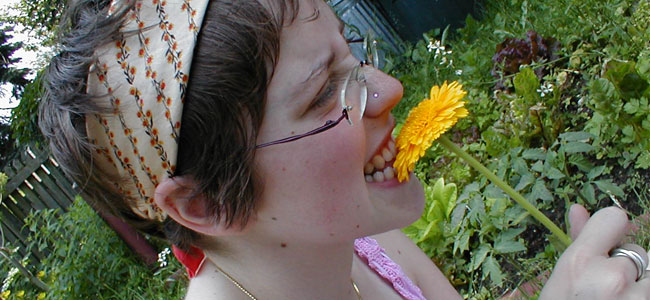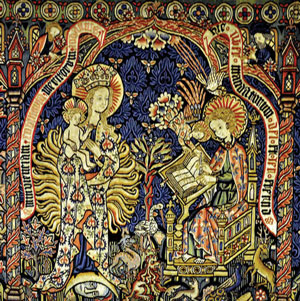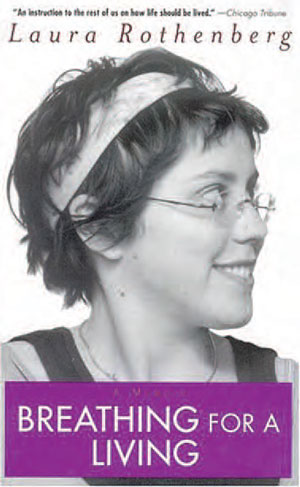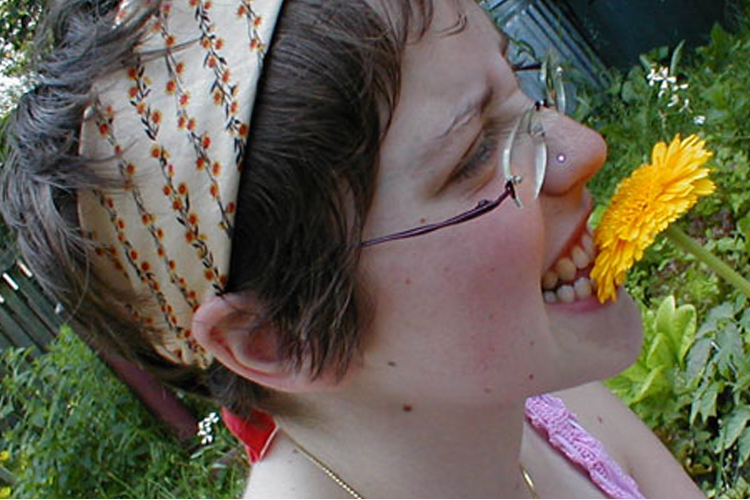The Life and Death of Laura Rothenberg

In February 2003, I went to Laura Rothenberg’s apartment to talk about her book, Breathing for a Living, which she wouldn’t live to see published. Laura was dying at age twenty-two. I wrote for a magazine about books and authors, and Laura didn’t want to be forgotten. When she was three days old she was diagnosed with cystic fibrosis (CF), an incurable genetic illness that over the course of her short life slowly made breathing, digesting food, and staying alive a consuming and ultimately impossible labor. Yet she also found a way to live a much larger life. In her writing and, as far as I know, in her life, Laura never used the expression “spiritual practice.” Yet her book, her National Public Radio diary, My So-Called Lungs, and her relationships, reveal that her heart and mind reached beyond her suffering even as she felt it intensely.
On the subway downtown, I remembered babysitting her one summer afternoon in the Catskills, while her parents prepared to lead a five-day spiritual retreat. We walked through the woods pretending we were explorers approaching a strange new land. I remembered asking her what she thought we needed to do next. “Who rules this kingdom?” she said standing straight and tall, articulating each word with regal confidence. She was a very little girl, and she was dispatching me to be a royal messenger. No lurking or spying for Laura. Even as a small child she had a definite presence.
I’d been warned that she was heavily medicated and unresponsive even when an ABC television crew sent by anchorwoman Diane Sawyer visited earlier. Yet her mother, Mary, answered the door of Laura’s loft looking exhausted but smiling, saying softly that she thought that talking would make her daughter happy. Laura knew her life was fleeting; in her photos, spoken diary, and writing, she sought to imprint it, to make impressions that would last.
I walked to her bedside as carefully as if I were cupping a lit candle. At 5’7″, she was down below ninety pounds. She was breathing through an oxygen mask, and her eyes were closed. I sat on the bed beside her and told her that I would do all the talking, that all she had to do was whisper and or nod. At first I couldn’t tell if she was listening or not. I reminded her of the good she would do by honestly sharing her experience, that she would allow other people to be vulnerable and open about their lives and their struggles.
Laura began to talk, whispering at first, telling me that she wanted people, especially medical students, to understand what it’s like to live with CF, and not just patients but loved ones and friends. She spoke a little about living a speeded-up life. With a degenerative disease like CF “you start out relatively healthy and get sicker and sicker over time. I remember that in seventh grade I could run the mile and was on the soccer team, and that in eighth grade I just couldn’t do it anymore.”
As she spoke, her voice grew stronger. Finally, she took off her oxygen mask and spoke in a clear, confident voice, making sure that the points she really wanted to make came through, including the importance of research and organ donation. She stressed that it was not her intention to write a sad book. “I really do believe that everyone has their own struggles, and even if their particular problems aren’t medical, they are related to what I’ve faced.”
Having a good life does not depend on health, she agreed. “I know seven-, six-, even two-year-old children who had transplants that did not go well. I’ve seen that a two year old will cry a lot when he gets stuck with a needle, but really all he wants to do is play with his puzzles and live his life. He really doesn’t know any other way than having lots of cords and lines connected to him and being in the hospital.”
“I’m a typical college student, if there is such a thing,” Laura wrote as a freshman at Brown University. “Except that I won’t be able to look back at my life from old age.” The sentences became part of a larger project during her sophomore year, when she became so ill that she withdrew from college to undergo the double lung transplant that ultimately failed to prolong her life. Weaving together essays, diary entries, poems, and emails to and from her many friends—dispatches from the shifting battlefields of CF and its treatment—Laura created a chronicle of her life as she lived it. She wrote with unadorned honesty and wry understatement, refusing to indulge in even a hint of false hope or sentimentality. Yet her voice resisted identification with an illness.
 What shines through Breathing for a Living is the sense that there is something in us that is not limited, that can seek and speak and be the truth. The reader comes away with the inkling that our greatest human power may not be our capacity to defend ourselves, to be unassailably strong and independent, but to be defenseless. The life of Laura proved that opening to our experience in its raw state without hope of escape makes us capable of opening to others as well.
What shines through Breathing for a Living is the sense that there is something in us that is not limited, that can seek and speak and be the truth. The reader comes away with the inkling that our greatest human power may not be our capacity to defend ourselves, to be unassailably strong and independent, but to be defenseless. The life of Laura proved that opening to our experience in its raw state without hope of escape makes us capable of opening to others as well.
In her review of the book, Janet Maslin of the New York Times commented on the charismatic effect Laura had on others, including celebrated others. Laura’s NPR radio diary, My So Called Lungs, airing before the book was published, made her a personality in her own right. Yet that minor celebrity didn’t account for the way her presence, her way of being, touched and drew people, including busy and typically guarded famous people.
One of the testimonials for Breathing for a Living came from Diane Sawyer. Of the transplant she wrote: “It was a reminder that life doesn’t let us choose. But oh how it lets us love.” Later, the ABC anchor produced an ABC segment about Laura. Author Andrew Solomon wrote a profile. Actor Bill Murray helped fund the Laura Rothenberg Bronchoscopy and Endoscopy Center at New York-Presbyterian Morgan Stanley Children’s Hospital.
Laura had a gift for creating relationships with all kinds of people, her mother told me. “Laura could do this very quickly,” she said. “She could meet someone [Diane Sawyer happened to be working on a story in a hospital room across the hall] and immediately establish a friendship.” Mary explained there was nothing unreal or unwholesome about those relationships. They weren’t based on pity or projection. “They were real, complete relationships,” she said.
Mary knew this because she saw Diane Sawyer and the others from the back during her daughter’s last days. She saw them come in quietly and go sit down beside her bed. She saw them lean in to hear and speak. She saw from their postures that nothing about these relationships was forced or false. These people and Laura were bridging separation, meeting in the middle, one human being to another.
Of all the celebrated people drawn to Laura, she called one her “godmother.” Identified in her book only by first name but clearly recognizable in photographs was the actress Debra Winger.
“Laura was a giver,” said her mother. “Her relationship with Debra Winger was very special. No one could cheer up Laura in the hospital like Debra. But Laura gave too. Laura could never have survived the ordeals she underwent without Debra and her other friends. But I think their sense of the meaning of life and of living grew because of her. She really listened. She was really interested.”
 Months after Laura’s death, Debra Winger and I sat on a couch in a cozy family room that Laura liked, in a sprawling house on the edge of the Hudson north of New York City. Winger described a friendship that unfolded over many years, through most of Laura’s life, and went through many stages for both of them. “It’s just an illusion that we can hang on to anything anyway. Everything is changing all the time. All you can do is be open to what is happening.”
Months after Laura’s death, Debra Winger and I sat on a couch in a cozy family room that Laura liked, in a sprawling house on the edge of the Hudson north of New York City. Winger described a friendship that unfolded over many years, through most of Laura’s life, and went through many stages for both of them. “It’s just an illusion that we can hang on to anything anyway. Everything is changing all the time. All you can do is be open to what is happening.”
During Laura’s childhood and early adolescence, Winger was a glamorous young movie star who gave iconic performances in Urban Cowboy, An Officer and a Gentleman, and Terms of Endearment. She was a generous fairy godmother. “I took her on shopping sprees or I would take her on location if I was shooting a movie.”
By the time Laura entered college, however, she grew very sick, and Winger began performing more urgent and intimate tasks. The three-time Academy Award nominated actress became Laura’s first choice to wash her hair in the hospital. Later, after the double lung transplant, she teamed with Laura’s parents and another family friend to be among those allowed to be with Laura day or night in the ICU. Winger proved especially good at holding Laura in a way that quelled the violent shaking episodes that came in the first few days after surgery.
“I don’t want to see anything written about how selfless I was, about how much I gave,” Winger told me. “If there were a scale that could weigh the friendship, I would be the embarrassed one.” She described the generosity of Laura’s attention and compassion. Laura gave the whole of herself to her friends and never seemed to cross anyone off her list. As the years passed and Laura grew sicker, a light seemed to shine from her, explained Winger. “There was this unbelievable purity that emanated from her that people would call sunniness.”
Laura cultivated this quality, explained the actress. She compared what Laura did to the work of composing a piece of music, throwing out every false note. With the sickness came a process of inner refinement, a search for what is essential.
“When I say, ‘She was so sunny,’ you might think of something God-given; and when I say it’s cultivated, it might sound fake, and it usually is fake when it’s cultivated. But this was real and pure, and you don’t see that very often. It was a fierce sunniness, a distilled sunniness, and it couldn’t be broken.”
Debra Winger met Laura Rothenberg when Laura was eighteen months old. The actress had been taken to meet Lord John Pentland, who was staying in the guest house of a friend. A brilliant, charismatic Scottish aristocrat, Pentland had been a student of G.I. Gurdjieff and P.D. Ouspensky, and worked closely with Gurdjieff’s closest student, Mme. Jeanne de Salzmann.
Over time, Winger came to revere Pentland for his wisdom. Yet even in that first meeting there was something about the way he related to his tiny granddaughter that struck a chord. “I can remember the very day,” Winger told me. “Lord Pentland was needed somewhere but he wasn’t leaving until he fixed Laura’s little tape player. I didn’t know anything about Laura then. I didn’t know she had a disease. I just watched their relationship.”
There was no talking down to the baby girl, no rushing, no automatic or dismissive answers. The dignified elderly British peer and spiritual teacher gave Laura his full attention, relating to her in a complete and conscious way, as one human being to another.
“This was very important to me,” Winger told me. “In some ways it became the way I was determined to be with Laura, and with my own kids. As much as possible, I wanted to let our different ages and our different stations in life fall away and just be together, really together.”
Lord Pentland treated Laura as if she were a real person negotiating a real world, and her parents, Jon and Mary, raised Laura as if caring for her was a privilege. There was a reverence, a wish to help rather than to impose, an understanding that had she lived a long life she would have accomplished great things. This extraordinary container of conscious love and acceptance undoubtedly helped Laura meet the great challenge of CF, helping her remember that there was something in her that was not sick, that was worthy and connected to a greater wholeness.
“She admits in her poetry and other writings that she wouldn’t be her without the disease,” Winger told me recently. But all of the conditions in Laura’s life made her who she was. “After she passed, I heard the purity of letting herself be the age she was, allowing herself to write in that raw, journal-style way.” Laura had the confidence, the sense of worthiness, to be who she was. “But I’ve also wondered if that was the reason why she wasn’t treated by every doctor with gravitas. I’ve often wondered what the cut-off age or status in life is for being treated like a human being.”
Ten years on, Laura and her work is the center of Debra Winger’s latest project in narrative medicine, an approach that values the stories of peoples’ lives and experiences in clinical practice. “I think reading The Death of Ivan Ilyich [Tolstoy’s masterpiece about a man grappling with dying and the meaning of his life] can be more important in medical training than reading a dozen medical journals,” says Winger. “It can help doctors unlock the important questions.”
Inspired by the example of the late Dr. Steven Z. Miller, a beloved director of pediatric emergency medicine at New York-Presbyterian Hospital/Columbia University Medical Center, who knew Laura and who was dedicated to promoting humanism in medicine, Winger has conceived of a rotating program at Columbia using Laura’s book, her NPR radio diary, and her poetry as a way of educating medical students, interns, and residents. The program will kick off in the autumn of 2014, with a talk at intern orientation week by author Andrew Solomon, whose 2003 magazine profile of Laura and recent book Far From the Tree powerfully convey what it is like to live with a condition that makes a person “other.”
Pressed to define her role, Winger laughs that “role” is a strange word for her. Her vision of a new kind of course began with a memory of a door. Laura spent much of her life in the hospital and decorated each of her doors in a wonderful way, making them visual reminders that the being on the other side was more than a disease. “For me it was a threshold, a reminder to pass through and bring as much of myself as possible,” says Winger.
Laura died weeks after I interviewed her; months later her book was officially published and a reading was arranged in a downtown bookstore that was decorated to resemble a cozy Victorian library. The event opened with a recording of Laura from her NPR radio diary, speaking in a warm, clear voice about her fear of being forgotten; then Laura’s boyfriend Bryan Doerries and Debra Winger took over.
 Standing very still at a podium, surrounded by books and dark wooden paneling, the actress looked a little as she had in her Oscar-nominated performance in the 1993 movie Shadowlands, the love story of American poet Joy Gresham and the great British author C.S. Lewis (played by Anthony Hopkins).
Standing very still at a podium, surrounded by books and dark wooden paneling, the actress looked a little as she had in her Oscar-nominated performance in the 1993 movie Shadowlands, the love story of American poet Joy Gresham and the great British author C.S. Lewis (played by Anthony Hopkins).
“We have lungs,” Winger read, launching into Laura’s account of her lung transplant and its aftermath, the most dramatic and heartbreaking part of the book. Laura had received a call from a doctor at Boston Children’s Hospital at dawn. She had been staying in the borrowed Brookline apartment she had lived in for four months, waiting for this moment to come. Laura called her parents and Winger with the news; none of them happened to be in Brookline although they had all visited her often.
Winger read about Laura’s mother arriving at the hospital “exhausted and glowing;” she read about how calm and ready Laura felt even as her body began to shake with fear, about the many friends who heard the news and showed up at the hospital, gathering around Laura’s gurney, hugging her, crying, until the elevator doors closed and Laura went to the OR.
Somewhere in the course of the chapter, Winger stopped reading and began to speak with Laura’s wry understatement, sorrow, and strength. Winger seemed to dissolve so that more of Laura could come through. It felt like a spontaneous offering, an act of opening, of completely forgetting herself so she could remember her friend.
“Those are the moments I crave,” Winger told me. “I start reading and I’m Debra reading Laura. I’m invoking her memory. I’m trying to feel close. I’m trying to get quiet so I can remember. Then if grace happens, there is no separation. I feel a thread of connection with Laura. I hope I feel it for the rest of my life.” ♦
